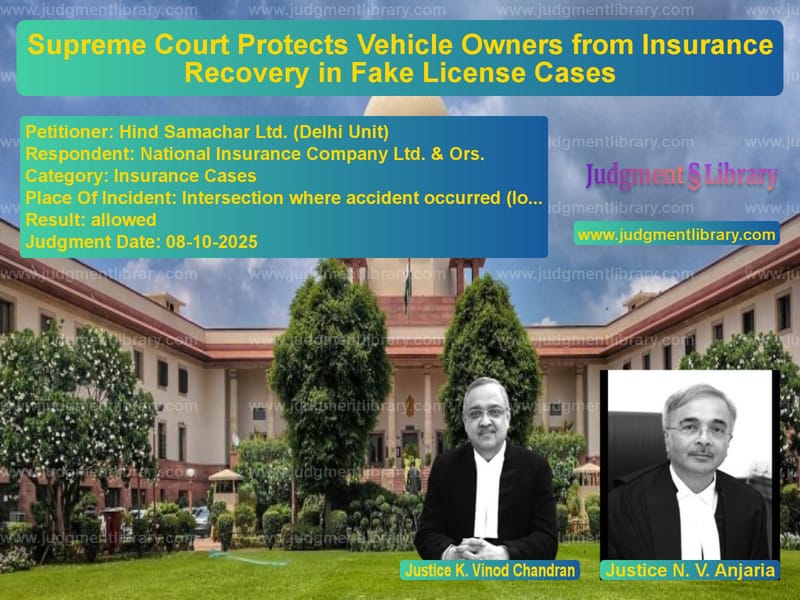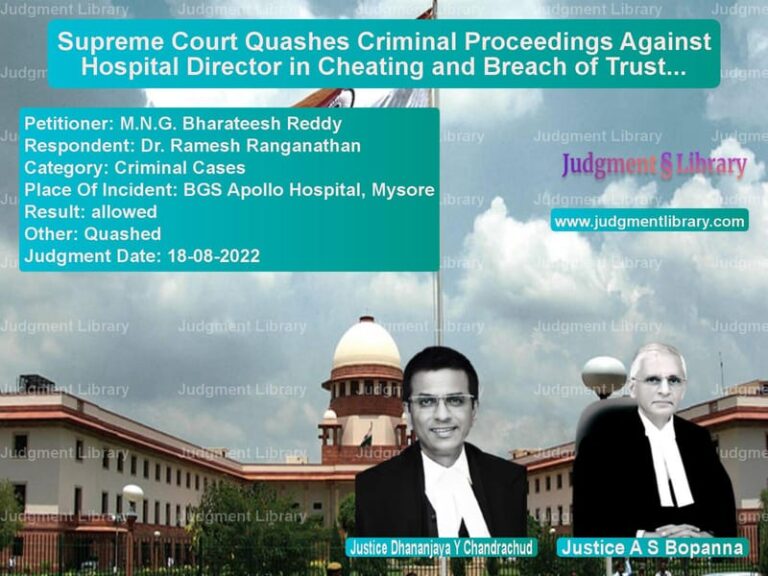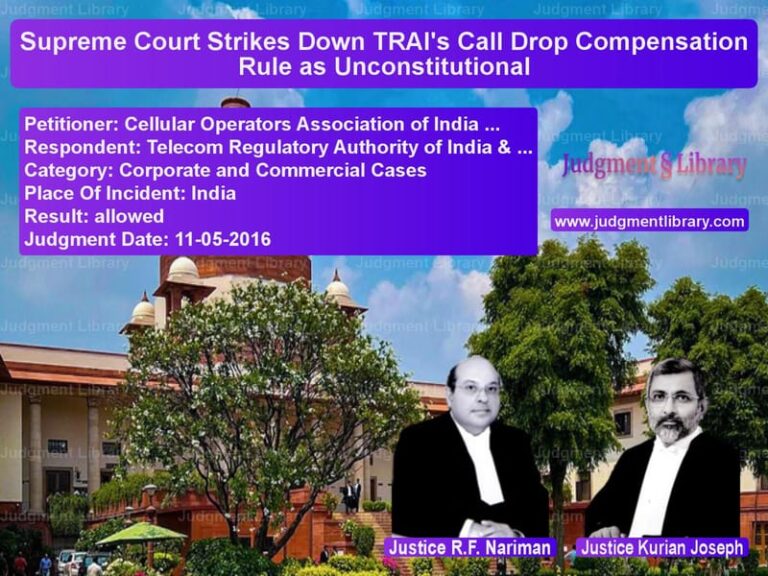Supreme Court Protects Vehicle Owners from Insurance Recovery in Fake License Cases
In a significant judgment that brings relief to vehicle owners across the country, the Supreme Court has ruled that insurance companies cannot automatically recover compensation amounts from vehicle owners merely because a driver was found to possess a fake license. The case involved a tragic accident that claimed nine lives and left two injured, leading to a complex legal battle between a truck owner and an insurance company over who should ultimately bear the financial responsibility for the compensation.
The judgment delivered on October 8, 2025, by Justices K. Vinod Chandran and N. V. Anjaria, clarifies the legal position regarding an insurance company’s right to recover compensation amounts from vehicle owners when drivers are found to have fake licenses. The Court emphasized that insurance companies must prove that the vehicle owner deliberately committed a breach by knowingly entrusting the vehicle to a driver with a fake license, rather than simply establishing that the license was fake.
The Tragic Accident and Legal Proceedings
The case originated from a devastating accident that occurred on January 26, 1993, at 2:00 AM at an intersection where a truck and a Matador van collided. The accident resulted in nine fatalities and two injuries among the passengers of the Matador van. Multiple claim petitions were filed before the Motor Accident Claims Tribunal by the victims and their families.
The Tribunal, after examining the evidence including the FIR, witness testimonies, and site plan, found composite negligence on the part of both drivers and apportioned liability at 75% for the truck driver and 25% for the Matador van driver. Both insurance companies were directed to pay compensation to the claimants.
However, the insurance company for the truck later sought recovery rights from the truck owner, alleging that the driver possessed a fake driving license. The High Court granted “pay and recovery” directions to the insurance company, which meant the insurance company had to pay the compensation but could later recover it from the vehicle owner. It was this order that the truck owner challenged before the Supreme Court.
The Arguments Presented
Mr. Gopal Shankaranarayan, the learned Senior Counsel appearing for the appellant truck owner, argued that the Tribunal had correctly directed the insurance company to indemnify the owner despite noticing the two driving licenses produced. He contended that “the High Court has gone on surmises and conjectures in presuming that the owner of the vehicle, the appellant herein, had colluded with its driver to obtain a fake licence based on a register produced from the office of the District Transport Officer, Gurdaspur, which by reason of many interpolations made therein could not have been relied upon.”
The appellant’s counsel pointed out that the testimony of the witness from the DTO office was against the certificate issued by the same office, which had indicated that the driving license was issued and later renewed. He relied on several Supreme Court precedents including United India Insurance Company v. Lehru and Ors., National Insurance Co. Ltd. v. Swaran Singh, and PEPSU RTC v. National Insurance Co. Ltd.
On the other side, Dr. Manish Singhvi, the learned Senior Counsel for the respondent insurance company, argued that both licenses produced – one by the police and one by the owner – were found to be fake. He vehemently contended that “unlike the usual practice of the driver producing the driving licence, here, the owner’s representative had produced it before the Tribunal which clearly indicates a collusion.” The insurance company maintained that the registered owner of the truck was negligent in entrusting the vehicle to the driver and therefore should bear the ultimate financial responsibility.
The Supreme Court’s Legal Analysis
The Supreme Court conducted a thorough analysis of the legal principles established in its previous judgments. The Court referred to the landmark case of United India Insurance Company v. Lehru and Ors., where it was held that “in order to avoid liability it is not sufficient to show that the person driving at the time of accident was not duly licensed. The Insurance Company must establish that the breach was on the part of the insured.”
The Court also examined the three-judge bench decision in National Insurance Co. Ltd. v. Swaran Singh, which clarified that “the defence to the effect that the licence held by the person driving the vehicle was a fake one, would be available to the insurance companies, but whether despite the same, the plea of default on the part of the owner has been established or not would be a question which will have to be determined in each case.”
In PEPSU RTC v. National Insurance Co. Ltd., the Court had held that when an employer had employed a driver who had been put through a driving test and training, and the accident occurred after six years of service, it couldn’t be said that the insured was at fault for employing a person whose license was later proved to be fake.
Most significantly, the Court referred to its recent judgment in IFFCO Tokio General Insurance Co. Ltd. v. Geeta Devi, where it deprecated “the practice of the insurance companies blithely claiming that the deceased vehicle owner did not conduct due diligence while employing a driver; which is not a condition prescribed either in the statute or in the insurance policy, despite the wealth of precedents.”
The Court in Geeta Devi had specifically held that “the insurance policy did not require the vehicle owner to undertake verification of the driving licence of the driver of the vehicle by getting the same confirmed with the RTO. Therefore, the claim of the petitioner-insurance company that it has the right to recover the compensation from the owners of the vehicle, owing to a willful breach of the condition of the insurance policy, viz., to ensure that the vehicle was driven by a licenced driver, is without pleading and proof.”
Factual Scrutiny of the Present Case
The Supreme Court meticulously examined the factual matrix of the case. The Court noted that the driving license seized from the driver at the accident spot was produced by a Clerk from the record room in Tis Hazari Court, who claimed it was seized by them. However, the Tribunal had specifically noticed that “neither the Clerk nor the Court could have seized the driving licence at the time of accident.”
The Court found no substance in the insurance company’s argument that collusion could be inferred merely because the driving license was produced by the owner. The Court observed that “the owner of the truck is not an individual and is a company, as we see from the cause title. Undisputedly, even if the tort-feasor is the driver, the liability for any negligence of the driver rests on the owner of the vehicle, vicariously. There can be no suspicion raised merely because the owner had produced the driving licence before Court. It only indicates that the owner had been diligent enough to procure the driving licence from the driver and produce it before the Tribunal, so as to validly raise a case for indemnification by the insurer.”
The Court also noted important discrepancies in the evidence. The office of the DTO, Gurdaspur had issued a certificate indicating that the driving license was issued on April 5, 1991, and was later renewed. However, a Clerk from the same office claimed that no such license was issued from their office and no amount was deposited towards driving license fees on August 21, 1990. The Court immediately noticed that “the date 21.08.1990 has no nexus with the date of issuance of R1W1/1, which was first issued on 05.04.1991 and the renewal effected on 11.08.1994.”
The Court further observed that the DL register produced from the DTO office was full of interpolations, and the High Court had inferred collusion based on the presence of a color photograph in the register from 1990. However, the Court noted that “the collusion at best can be only alleged for the production of the licence and not with respect to the entrustment of the vehicle.”
Crucial Finding on Due Diligence
In a significant observation, the Court emphasized that “the insurance company from the totality of the circumstances has to bring out the absence of due diligence in the employment of the driver or the entrustment of the vehicle, to prove breach by the insured, which is totally absent in the present case.”
The Court found that there was no pleading or substantiation that due diligence had not been employed at the time of entrustment. The witness examined on behalf of the owner was not questioned about the actual entrustment of the vehicle or whether the driver was employed regularly or temporarily, which the Court noted were “crucial insofar as proving or disproving due diligence by the owner at the time of engagement of the driver and the entrustment of the vehicle.”
The Court reinforced the established legal principle that “the owner of a vehicle employing a driver can only look at the licence produced by the person seeking employment and is not expected to verify from the licence issuing authority whether the licence is fake or not.”
Final Ruling and Implications
The Supreme Court allowed the appeals and set aside the High Court’s order granting recovery rights to the insurance company. The Court held that “the High Court had erred in finding that there was collusion between the employer and the employee merely for reason of the driving licence having been produced by the employer and the driver having not contested the claim.”
The Court noted that drivers often keep themselves away from legal proceedings due to fear of incriminating themselves in pending prosecutions, and it’s the employer who has to contest the matter due to vicarious liability.
This judgment provides significant protection to vehicle owners who act in good faith while employing drivers. It establishes that insurance companies cannot shift the entire burden of compensation to vehicle owners merely by establishing that a driver’s license was fake. Instead, they must prove that the vehicle owner knowingly and deliberately entrusted the vehicle to a driver with a fake license, failing which the insurance company must bear the liability.
The ruling brings clarity to an area of law that affects millions of vehicle owners and insurance companies across the country, ensuring that vehicle owners who exercise due diligence are not unfairly penalized for circumstances beyond their control.
Petitioner Name: Hind Samachar Ltd. (Delhi Unit).Respondent Name: National Insurance Company Ltd. & Ors..Judgment By: Justice K. Vinod Chandran, Justice N. V. Anjaria.Place Of Incident: Intersection where accident occurred (location not specified in judgment).Judgment Date: 08-10-2025.Result: allowed.
Don’t miss out on the full details! Download the complete judgment in PDF format below and gain valuable insights instantly!
Download Judgment: hind-samachar-ltd.-(-vs-national-insurance-c-supreme-court-of-india-judgment-dated-08-10-2025.pdf
Directly Download Judgment: Directly download this Judgment
See all petitions in Motor Insurance Settlements
See all petitions in Third-Party Insurance
See all petitions in Insurance Settlements
See all petitions in Road Accident Cases
See all petitions in Compensation Disputes
See all petitions in Judgment by K. Vinod Chandran
See all petitions in Judgment by N.V. Anjaria
See all petitions in allowed
See all petitions in supreme court of India judgments October 2025
See all petitions in 2025 judgments
See all posts in Insurance Cases Category
See all allowed petitions in Insurance Cases Category
See all Dismissed petitions in Insurance Cases Category
See all partially allowed petitions in Insurance Cases Category







